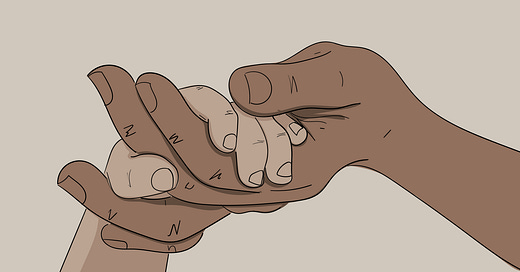How Do You Resist the Temptation to Save Someone You Love?
On reframing old patterns to help your relationship grow (while saving yourself).
The temptation to rescue someone you care about is rooted in one’s past where most often, at too young of an age, we were put in the situation of having to be a caretaker. Those of us who had parents with addictions, clinical depression or other serious mental health issues or caretakers who simply weren’t able to handle their own traumas or life stressors usually turn into “saviors”.
As a child, the message we and our growing brains (which are sponges at this stage of development) receive is: We are lovable and worthy of attention only when we are strong, helpful, being good, self-sacrificing, fill in the blank.
In turn, we develop our self-esteem and identities around that belief. This is why when we get into relationships we think it’s our job to save and why it’s difficult to relinquish the temptation to do so.
When we get into savior mode, we also stop paying attention to our own needs, something that comes hand in hand with the caretaking role because the other message we get is “Your needs aren’t important.”
To resist the temptation, I think it’s helpful to know your childhood pattern but more importantly, to reframe situations that trigger it. Meaning instead of acting on the impulse to fix the other, bring it back to yourself and ask:
“What needs of mine are not being met?
“What needs of mine do I need to express more of?”
To go a bit deeper: “What feelings, thoughts, or situations of mine could I be running from or ignoring by over-investing in so and so’s problems?
Instead of going into fix-it mode which is offering advice when it’s not asked for or trying to solve another person’s problem for them, ask this question to your loved one:
“Is there anything I can do in this moment to support you?”
Trying to save a person you love gives them the message that they don’t have the power to change themselves. Reframe and ask yourself:
“Would I want someone to give me that message?”
Replace obsessive worrying or impulses to fix with a visualization, imagining your loved one living their most empowered and fulfilled life.
Lastly, being supportive and trying to save have different kinds of energies where in the latter you become too caught up in the other, feel guilt for not being helpful enough, get controlling and so on until you feel completely drained. When boundaries get loose like this, we burnout.
I can’t resist adding this powerful poem by Mary Oliver who I think says it best.
The Journey
One day you finally knew
what you had to do, and began,
though the voices around you
kept shouting
their bad advice --
though the whole house
began to tremble
and you felt the old tug
at your ankles.
"Mend my life!"
each voice cried.
But you didn't stop.
You knew what you had to do,
though the wind pried
with its stiff fingers
at the very foundations,
though their melancholy
was terrible.
It was already late
enough, and a wild night,
and the road full of fallen
branches and stones.
But little by little,
as you left their voices behind,
the stars began to burn
through the sheets of clouds,
and there was a new voice
which you slowly
recognized as your own,
that kept you company
as you strode deeper and deeper
into the world,
determined to do
the only thing you could do --
determined to save
the only life you could save.





